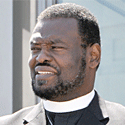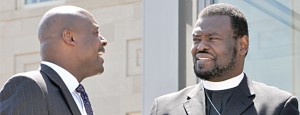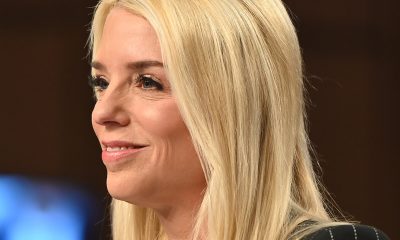Local
D.C. Appeals Court hears gay marriage case
City defends law halting effort to repeal same-sex marriage law


Same-sex marriage opponents Rev. Anthony Evans, left, and Bishop Harry Jackson talk Tuesday outside the D.C. Court of Appeals. A case before the court could force the city to put its same-sex marriage law before voters in a ballot initiative. (Washington Blade photo by Michael Key)
In what legal observers called an unusual development, the full nine-judge D.C. Court of Appeals heard oral arguments Monday for a lawsuit seeking to force the city to put its same-sex marriage law before voters in a ballot initiative.
At issue is whether a 1970s amendment to the D.C. City Charter that allows voters to pass or repeal laws through an initiative or referendum can legally include a provision banning such ballot measures if they would take away rights from minorities.
The City Council added the provision to the charter amendment at the request of gay activists. The effort by same-sex marriage opponents to challenge the provision represents the first time it has been seriously questioned in more than 30 years.
All but two of the judges asked pointed questions that appeared to challenge the legal arguments presented by the lawyers on both sides of the case, taking on the role of devil’s advocate.
“The court asked a variety of probing questions, as they should have,” said Thomas Williamson, an attorney with Covington & Burling, which filed a friend of the court brief on the side of the D.C. government in defense of the law restricting ballot measures.
“But it seemed that a consistent theme in their questions was a sensitivity to the importance of protecting civil rights of a vulnerable minority, which is really what this case is about here — the right of same-sex couples to enjoy marriage and have the same status for their marriage as all other citizens of the District,” Williamson said.
Five of the nine judges, including Chief Judge Eric Washington, were appointed by President George W. Bush. President Bill Clinton appointed the remaining four.
Williamson and local gay rights attorney Mark Levine said it’s unusual for the Court of Appeals to hear a case for the first time en banc, or with all of its judges, instead of its usual practice of assigning a three-judge panel to hear a case.
One significant outcome of an en banc case is that the full court has the authority to overturn previous decisions it handed down either en banc or through a three-judge panel if the previous rulings would interfere with its intentions in a current case. Williamson said one possible ruling the court might overturn in the current case over the D.C. same-sex marriage law is the 1990s case known as Dean v. the District of Columbia.
In that case, the appeals court rejected a claim by a gay male couple that the city’s existing marriage law allowed for the issuance of marriage licenses to same-sex couples because of the Human Rights Act’s ban on discrimination based on gender and sexual orientation. At that time, the court ruled that the marriage law restricting marriages to opposite-sex couples took precedence over the Human Rights Law.
In recent years, gay rights attorneys and D.C. government officials have argued that the Dean decision was no longer relevant because the City Council had since made sweeping changes to the marriage law, providing extensive rights, including marriage, for same-sex couples.
Austin Nimocks, legal counsel for the Alliance Defense Fund, a Christian litigation group, argued the case Tuesday for Bishop Harry Jackson and other local opponents of same-sex marriage who filed the lawsuit seeking a ballot measure to overturn the gay marriage law.
Jackson initially filed his lawsuit before the D.C. Superior Court last fall, after the D.C. Board of Elections & Ethics rejected his application for a voter initiative calling for defining marriage in D.C. as the union between one man and one woman. The board ruled that the initiative would violate the provision added to the referendum and initiative law that bans such ballot measures if they would result in discrimination prohibited by the Human Rights Act.
The effect of the initiative, if approved by voters, would be to repeal the same-sex marriage law that the City Council passed and Mayor Adrian Fenty signed in December. The law took effect March 3 after it cleared a required 30 legislative day review by Congress.
Jackson then filed suit seeking to overturn the election board’s decision. In January, Superior Court Judge Judith Macaluso upheld the election board’s decision, saying the law cited by the city to ban such ballot measures was valid.
Tuesday’s hearing before the D.C. Court of Appeals came about after Jackson and his supporters appealed Macaluso’s ruling.
Nimocks sidestepped reporters’ questions about the appeals court judge’s comments, including those who challenged his arguments. He said after the hearing that his side is correct in claiming the 30-year-old provision in the D.C. Charter barring certain ballot measures violates the full District of Columbia Charter.
The city’s charter is considered to be equivalent to a state constitution, and legal experts say all laws enacted by the City Council and signed by the mayor must be consistent with any restrictions or limits set by the charter.
Nimocks argued before the court Tuesday that the charter amendment that created the city’s voter initiative and referendum system sets just one restriction on such ballet measures: a ban on voters directly deciding on matters related city funding or taxes.
He said the charter amendment, which the City Council passed and Congress approved, doesn’t allow further restrictions that would prevent a ballot measure seeking to curtail minority rights.
“The people have a right to vote that’s guaranteed by the District of Columbia Charter,” he said. “And the City Council cannot amend the charter. They cannot do anything to undermine the people’s right to vote.”
In his written brief, Nimocks also argued that the Dean case was still a factor that the appeals court should consider.
Todd Kim, the D.C. Solicitor General who argued on behalf of the city, told the court the charter amendment establishing the initiative and referendum system gives the City Council authority to make some changes in the system to carry out its “purpose.”
Kim noted that the Council wrote the charter amendment and that part of the purpose in creating it was to place certain restrictions consistent with longstanding city policy, including policies related to rights of minorities. The D.C. Human Rights Act, which was in place at that time, included a ban on discrimination based on sexual orientation, Kim said, indicating the city’s overall policy and purpose was to protect the rights of gays and lesbians along with other minorities.
He also noted that Congress approved the charter amendment through its normal 30 legislative day review, further solidifying its status as a valid law.
In another development that pleased gay activists attending Tuesday’s appeals court hearing, Judge Phyllis Thompson, a Bush appointee, pointed out that D.C. voters approved a statehood constitution in the early 1980s that included a provision banning initiatives and referenda that would take away rights of minorities, including gays.
Thompson appeared to be challenging Nimocks’ arguments that voters should have the right to decide on the gay marriage law by noting that D.C. voters approved the ban on ballot measures seeking to take away rights for gays and others.
Legal experts have said the statehood constitution passed by voters had no legal standing because D.C. statehood — which many D.C. residents favored in the 1980s — could not come about without approval by Congress. Congress never took the proposal seriously.
But Levine and Williamson said Thompson’s decision to raise the issued shows that she, and possibly a number of her colleagues on the appeals court, are sympathetic to the city law banning ballot measure that would take away rights, including the right of same-sex couples to marry in D.C.
“Marriage equality has already brought critical rights and responsibilities to hundreds of same-sex couples, yet outside forces are determined to undo our progress,” said Aisha Mills, president of the Campaign for All D.C. Families, one of the local groups that lobbied for a same-sex marriage law.
“As the courts have uniformly recognized in upholding D.C.’s comprehensive anti-discrimination laws, no one should have to have their marriages — or any of their civil rights — put to a public vote,” she said.
Jackson was among more than a hundred spectators to attend Tuesday’s appeals court hearing. The spectators appeared to be equally divided between same-sex marriage opponents and supporters, with many of the city’s prominent LGBT activists in attendance.
In addition to Washington and Thompson, the appeals court members include Judges Vanessa Ruiz, Inez Smith Reid and Stephen Glickman, who are Clinton appointees, and Judges John Kramer, John Fisher, Anna Blackbourne-Rigsby and Kathryn Oberly, who are Bush appointees.
Court observers say a decision on the marriage case could come anytime between the next several months and more than a year. The losing party could appeal the case to the U.S. Supreme Court, but many legal observers believe the high court would be unlikely to take the case.
District of Columbia
Gay Men’s Chorus of Washington to celebrate Spring Affair honorees
‘Their work inspires our music and deepens our mission’

For 44 years, the Gay Men’s Chorus of Washington (GMCW) has served as a powerful voice for love, unity, and pride among Washington’s LGBTQ community and its allies. Since its first performance in 1981—at the opening of the National Gay Task Force’s Washington office (later becoming the National LGBTQ Task Force)—GMCW has built a politically engaged and culturally significant legacy as one of the nation’s foremost LGBTQ performing arts organizations.
As its music and mission evolved, GMCW deepened its involvement in supporting LGBTQ individuals and allies alike. In 2004, the chorus launched its first Spring Affair fundraiser. This annual event not only generates financial support for the inclusive choral group, but also honors individuals and organizations in the Washington community who exemplify GMCW’s mission of unity, equity, and empowerment through music.
Each year at the Spring Affair gala, the chorus honors one community leader, one external organization, and one GMCW member. For the 2025 gala, GMCW will recognize Bishop Mariann Edgar Budde, Atlas Performing Arts Center, and GMCW member Keygan Miller.
“These honorees remind us why we sing,” said Thea Kano, artistic director of the Gay Men’s Chorus of Washington, DC, in an email. “In moments when our community has needed strength, they’ve offered hope. Whether it’s a brave voice from the pulpit, a tireless advocate for our youth, or an organization that opens its doors to every story—each has chosen to lead with love, truth, and courage. Their work inspires our music and deepens our mission.”
GMCW will honor Bishop Mariann Edgar Budde, the first woman elected to lead the Episcopal Diocese of Washington, as its 2025 individual award recipient. A longtime champion of equity and inclusion, Bishop Budde gained national prominence during the Inaugural Prayer Service at Washington National Cathedral, where she spoke directly to newly sworn-in President Donald Trump.
“Have mercy, Mr. President,” she implored, lifting the hopes of the most vulnerable Americans targeted by Trump’s policies—particularly LGBTQ and immigrant communities. Her bold words signaled to the nation that she remains a genuine and outspoken voice for justice, unity, and truth, inspiring compassion and faith within and beyond her religious community.
GMCW will present the Harmony Award for an Organization to the Atlas Performing Arts Center, located in the historic H Street, N.E. corridor. In 2024 alone, Atlas hosted more than 400 events and provided $1.6 million in free and discounted tickets, arts education, community programming, and space use. Through this work, Atlas has amplified “artistic voices that reflect the full diversity of our community.”
The center has long partnered with GMCW, offering space for open mic nights, cabarets, GenOUT Chorus events like the Youth Summit, and even memorial services such as that for Bobby T. Boaz. Atlas exemplifies GMCW’s mission of storytelling, equity, and civic connection through programs like the INTERSECTIONS Festival and City at Peace.
“We are absolutely thrilled and deeply honored that the Atlas Performing Arts Center has been named a recipient of the GMCW Harmony Award! This recognition is a powerful affirmation of our commitment to uplifting voices, fostering inclusive creative expression, and building a space where everyone feels seen, heard, and celebrated,” said Jarrod Bennett, Executive Director of the Atlas Performing Arts Center.
“At the Atlas, our mission is rooted in the belief that the arts are for everyone—and that through performance, dialogue, and community, we can help shape a more just, compassionate world. To be acknowledged by the Gay Men’s Chorus of Washington, DC—an organization that has long stood at the forefront of championing equality and advancing the well-being of the LGBTQ+ community—is a profound and humbling honor. We continue to be inspired by GMCW’s work and are proud to stand alongside them in this shared vision. Thank you, GMCW, for this beautiful recognition. We carry it forward with gratitude and renewed energy for the work ahead.”
Finally, GMCW will honor Keygan Miller, a chorus member since 2017, for their leadership, advocacy, and commitment to equity both onstage and off. Within GMCW, Miller served as Vice President of Diversity and Inclusion, led conversations to expand trans inclusion, authored the “Day One” pledge, and played a critical role in shaping inclusive programming.
Outside the chorus, Miller serves as Director of Public Training for The Trevor Project, a national nonprofit focused on crisis intervention and suicide prevention services for LGBTQ youth under 25. They previously worked as an Advocacy Manager at the Trevor Project, where they championed policies protecting LGBTQ+ youth at every level of government.
As GMCW continues its mission to uplift and unite through music, the organization encourages new voices to join its ranks. GMCW welcomes all singers—regardless of gender identity or sexual orientation—who can sing in the lower vocal registers.
The 2025 Spring Affair Gala will take place on May 17, 2025, at The Ritz-Carlton, Washington, D.C. This annual benefit supports GMCW’s artistic and educational programming. For tickets, audition information, and more, visit GMCW.org.
District of Columbia
Activists stage reenactment of 1965 gay rights protest at White House
Event marked 60th anniversary of historic picketing

With dozens of tourists watching, a little over two dozen LGBTQ activists walked in a circular picket line carrying “homosexual rights” signs on the sidewalk in front of the White House on April 17 in a reenactment of the historic 1965 first gay rights protest outside the White House.
Organized by D.C.’s Rainbow History Project, the event marked the 60th anniversary of the 1965 protest, which was organized by gay rights pioneers Frank Kameny and Lilli Vincenz on behalf of the Mattachine Society of Washington, one of D.C.’s first gay rights groups that Kameny co-founded in the early 1960s.
“The White House picket is the origin story for public demonstrations for gay rights in the U.S., and the origin story for Pride marches and the annual LGBTQ Pride celebrations which occur across the globe,” according to a leaflet prepared by Rainbow History Project that participants in the reenactment handed out to passersby and tourists.
Among those participating in the reenactment protest was longtime D.C. LGBTQ rights advocate Paul Kuntzler, who is the last known survivor of the 1965 White House gay rights protest. Kuntzler carried a replica of the sign he said he carried at the 1965 protest, which states, “Fifteen Million U.S. Homosexuals Protest Federal Treatment.”

Other signs carried by participants stated, “Homosexuals Died for Their Country, Too;” “White House Refuses Replies To Our Letters – Afraid Of Us?”; “Cuba’s Government Persecutes Homosexuals, U.S. Government Beats Them To It;” “Homosexuals are American Citizens, Too.”
The leaflet that participants distributed at the April 17 reenactment, which includes a photo of the 1965 event, lists what it says were the four main demands issued by the Mattachine Society of Washington in 1965.
They called for an end to “the exclusion of homosexuals from federal employment,” an end to the ban on gays from serving in the U.S. military, an end to the “blanket denial of security clearances for gay people,” and an end to the government’s refusal to meet with the LGBTQ community or to reply to their letters.
The leaflet includes an excerpt from a letter that Kameny wrote to then-President Lyndon B. Johnson around the time of the 1965 protest.
“We ask you, Mr. President, for what all American citizens – singly and collectively – have the right to ask,” the letter states. “That our problems be given fair, unbiased consideration…consideration in which we, ourselves, are allowed to participate actively and are invited to do so.”
The leaflet notes that although Kameny died in 2011 and Vincenz died in 2023, “their legacy is carried on by modern LGBTQ+ rights activists, who continue to advocate for employment opportunities, legal protections, inclusive health services, and more.”
Rainbow History Project official Vincent Slatt, one of the lead organizers of the reenactment protest, said his group had no trouble obtaining a permit from the National Park Service to hold the event outside the White House.
“I think the picket is going very, very well today,” he said while watching the picketers on the White House sidewalk. “We have a couple of dozen people participating. And there are lots of tourists engaging,” he said. “We’re handing out pamphlets to let them know about the historic picket and the importance of learning LGBT history.”
Slatt added, “But the highest impact is really that the media showed up to spread awareness of this.”
Lesbian activist Leticia Gomez, while walking on the White House picket line at the reenactment event, said she was among those who benefited from the 1965 protest and those that followed in support of LGBTQ rights.
“I’m blessed,” she said. “I got to work 34 years for the federal government as an out lesbian in the Department of the Navy,” she told the Blade. “So, because of what they did and all the other protests that came after that, it allowed me to have the career that I had.”
Also walking the picket line at the April 17 reenactment event was Deacon Maccubbin, owner of the former D.C. LGBTQ bookstore Lambda Rising and organizer of D.C.’s first Gay Pride Day event in 1975.
“It was really wonderful to be here today after 60 years,” he said. “I wasn’t at the first one,” he told the Blade. “But it’s just wonderful that this happened in 1965. It started the ball rolling, and all the progress that we’ve made, the fact that we do gay Pride every year in D.C. – all of those are dependent on this demonstration that got started in 1965.”
District of Columbia
Capital Pride wins $900,000 D.C. grant to support WorldPride
Funds not impacted by $1 billion budget cut looming over city

Capital Pride Alliance, the nonprofit D.C. group organizing WorldPride 2025, this week received a $900,000 grant from the city to help support the multiple events set to take place in D.C. May 17-June 8.
According to an announcement by D.C. Mayor Muriel Bowser and Events D.C., the city’s official convention, sports, and events authority, Capital Pride Alliance was one of 11 nonprofit groups organizing 2025 D.C. events to receive grants totaling $3.5 million.
The announcement says the grants are from the city’s Large Event Grant Program, which is managed by Events D.C. It says the grant program is funded by the Office of the D.C. Deputy Mayor for Planning and Economic Development through a grant from the U.S. Department of Commerce Economic Development Administration.
Nina Albert, the Deputy Mayor for Planning and Economic Development, told the Washington Blade that because the grants consist of federal funds already disbursed to the city, they are not impacted by the billion dollar budget cut imposed on the city by Congress earlier this year.
“WorldPride is one of the 11 grantees, and we’re really just excited that there’s going to be generated a large crowd and introducing the city to a national and international audience,” Albert said. “And we think it is going to be a real positive opportunity.”
The statement from the mayor’s office announcing the grants says funds from the grants can be used to support expenses associated with hosting large events such as venue rental fees, security, labor costs, equipment and other infrastructure costs.
“All of those things are things that we do for our major events, including WorldPride,” said Ryan Bos, executive director of Capital Pride Alliance. “So, the resources from this grant will be extremely helpful as we approach the final weeks of preparation of WorldPride Washington, D.C.,” he said.
Bos said Events D.C. has been an important partner in helping to promote WorldPride 2025 since the planning began more than two years ago. “And we’re excited to have them now support us financially to get us over the finish line and have an amazing event.”
Both Bos and Deputy Mayor Albert said WorldPride organizers and D.C. government officials were doing all they can to inform potential visitors from abroad and other parts of the U.S. that the local D.C. government that is hosting WorldPride is highly supportive of the LGBTQ community.
The two said WorldPride organizers and the city are pointing out to potential visitors that the local D.C. government is separate from the Trump administration and members of Congress that have put in place or advocated for policies harmful to the LGBTQ community.
“D.C. is more than the federal city,” Bos told the Blade. “It’s more than the White House, more than the Capitol,” he said. “We have a vibrant, progressive, inclusive community with many neighborhoods and a great culture.”
Marcus Allen, an official with Broccoli City, Inc., the group that organizes D.C.’s annual Broccoli City Music Festival, reached out to the Blade to point out that Broccoli City was among the 11 events, along with WorldPride, to receive a D.C. Large Event Grant of $250,000.
Allen said the Broccoli City Festival, which includes performances by musicians and performing artists of interest to African Americans and people of color, is attended by large numbers of LGBTQ people. This year’s festival will be held Aug. 8-10, with its main event taking place at Washington Nationals Stadium.
“Visitors from around the world come to D.C. to experience our world-class festivals and events,” Mayor Bowser said in the grants announcement statement. “These grants help bring that experience to life, with the music, the food, and the spirit of our neighborhoods,” she said. “Together with Events D.C., we’re creating jobs, supporting local talent, and showcasing the vibrancy of our city.”
The full list of organizations receiving this year’s Large Event grants are:
• Restaurant Association of Metropolitan Washington
• National Cherry Blossom Festival, Inc.
• Asia Heritage Foundation
• Capital Pride Alliance
• U.S. Soccer Federation
• Broccoli City, Inc.
• U.S.A. Rugby Football Union
• Washington Tennis and Education Foundation
• D.C. Jazz Festival
• Woolly Mammoth Theatre Company
• Fiesta D.C., Inc.
“Events DC is focused on creating unique experiences that result in jobs, economic impact, and lasting memories for residents, tourists, and guests,” said Events DC President and CEO Angie M. Gates in the announcement statement. “Through the Large Event Grant Program, we will support even more remarkable events this year that build community connections, celebrate our distinctive culture, and contribute to our economy.”
-

 State Department4 days ago
State Department4 days agoHIV/AIDS activists protest at State Department, demand full PEPFAR funding restoration
-

 Brazil4 days ago
Brazil4 days agoUS lists transgender Brazilian congresswoman’s gender as ‘male’ on visa
-

 Federal Government5 days ago
Federal Government5 days agoWhite House sues Maine for refusing to comply with trans athlete ban
-

 District of Columbia4 days ago
District of Columbia4 days agoCapital Pride wins $900,000 D.C. grant to support WorldPride












